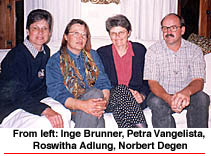
Mareb/Sana’a German Captives Speak of their Ordeal [Archives:1999/01/Governance]
January 4 1999

The Germans arrived safely in Sanaa on the first morning of 1999. They were met by Yemen Times reporter, Mohammed Bin Sallam.
This is what they have to say about their time in captivity:
Mr. Norbert Degen is a tourism expert who came to Yemen to evaluate the country’s tourist potential and the development of its tourism industry.
He said: “This is my first visit to this country. I came with my three colleagues to closely look into Yemen’s tourist attractions and the type of services provided. We run a travel agency in Germany and we wish to provide German visitors to Yemen with all the information they need.
“We had to have first-hand experience of Yemen and get the feel of the country. Our Yemeni experience culminated on December 6 with “forced” hospitality. We were kidnapped by a gang of the Bani Dhabyan tribe in Khawlan. Our abduction took place in broad daylight, on a traffic-laden highway, and with full view of security and army personnel. They did nothing to assist us. It was very weird and quite different from kidnappings in other countries.
“Despite Yemen enjoying a numerous potential for a fully fledged tourism industry and despite its gorgeous scenery and the legendary hospitality of its people, with all honesty we cannot recommend it to our clients. If we do and they get abducted, just like us, then we would be infringing the ethics of our profession.
“In addition to safety and security, Yemen must also provide its visitors with a good tourism infrastructure. We sincerely hope that this country will be safer for travelers in the near future. The government must never use force with kidnapers nor should it resort to retaliatory measures.
“Those kidnappers are in need of basic public services to alleviate some of the hardship they have to endure. The government should really improve their areas by raising their living standards. They’ll definitely abandon the kidnapping of foreign tourists if they feel that they are well looked after by the state. If the situation remains as it is, the kidnappings will continue and become a cry of protest by disadvantaged people. Although we still believe that abduction is a vile crime, the perpetrators must never be hanged. They were very kind and generous to us.”
Ms. Inge Brunner:
“The first four hours of being held “guests” were the worst. Our abductors or “hosts” led us on a very rugged mountain road. We got shot at from different directions. We became very frightened.
“After our arrival at their hideout, the kidnappers made it up for us with generous hospitality. They treated us very nicely with a lot of respect, trying to make our stay as comfortable as possible. This was despite their hard and austere life.
“Physically, we were OK, being well-fed and taken care of. However, with the passing of time, nervous tension increased and psychological pressure mounted. We were afraid that the government would use force trying to free us with uncalculated consequences, just like what happened to the British hostages. We never feared that the kidnappers might shoot us or something. On the contrary, were felt quite safe with them and confident that they’ll not harm us.
“Thank goodness we got out safe and sound with many memories to tell to our friends and relatives.”
Ms. Petra Vengelista:
“Our captors were very generous, bringing us all we wanted – food, cigarettes, fruits, etc. During the first two weeks of our captivity, we were the guests of a gracious Yemeni family. Women and children always wanted to know our needs so that they can answer them. We were allowed to wander in the vicinity of their home. Then we were moved to a second and a third place. While being moved, we were closely guarded.
“However, in the third place, the situation changed completely. We were placed in a 5×2.5m room, along with seven children, their parents and some relatives who occasionally visited them. There, the food was not good. We starved, only having the Ramadhan evening meal with the rest of the family. Rescue came with a bumper of tinned food sent by the German Ambassador. We told our “host” family that we cannot fast like them. They understood and appreciated our situation. So we were fed bread, rice, eggs, chicken, etc.”
Ms. Roswitha Adlung:
“During my time in captivity, I tried to write my memoirs. But I had to hide the papers because our captors banned us from writing, taking away the papers whenever they found them. I wrote in their absence.
“Yemen has a lot to write about. It is a country that deserves some risk in order to see it. I’ll certainly come back again, but I can’t recommend it to others because of the lack of security.
“The unfortunate thing is that the areas where kidnappings take place are just the places which tourists come to see, being rich with archeological and historical sites. I’m sorry to say that we were taken away in broad daylight on a road built by Germany.
“As a female I felt very sorry to see young children carrying AK47 rifles and hand grenades. These children must go to school instead to grow up into responsible adults. I also felt deep sympathy with the women. They do virtually everything: taking care of the children, cooking, looking for firewood, bringing in water, looking after their men folk, etc. Despite all that they were treated rather harshly, I though, by the men.”
——
[archive-e:01-v:1999-y:1999-d:1999-01-04-p:./1999/iss01/govern.htm]


